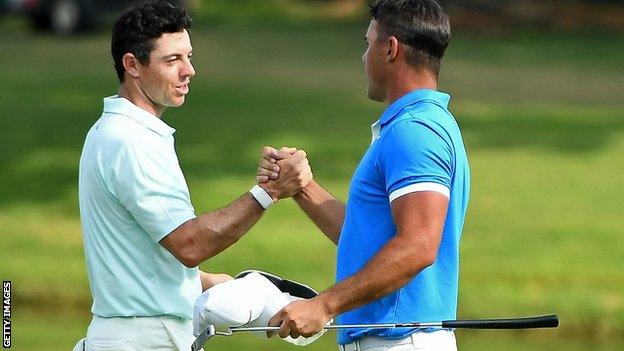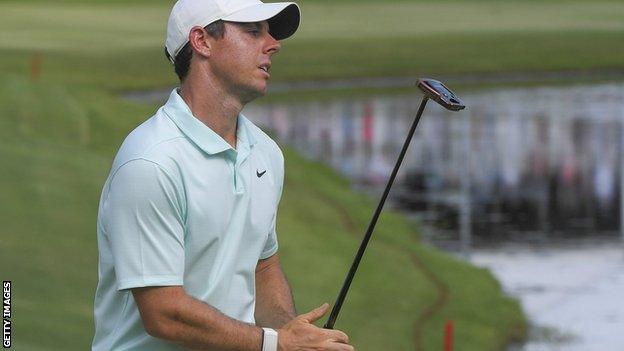Rory McIlroy has to find a way of playing his best when it is most required, writes Iain Carter
- Published

Rory McIlroy was paired with Brooks Koepka for the first time on the final day of a tournament at the World Golf Championships Invitational
The questions grow louder for the decade's most successful golfer but, heading towards the 2020s, what does the future hold for Rory McIlroy?
Aged 30, the Northern Irishman should be heading into his peak years. He certainly does not lack ability to add significantly to his tally of four majors and 25 professional wins.
This year he has played some of his finest golf. It has already yielded the Canadian Open title and before that the prestigious Players Championship.
That Sawgrass success in March threatened to be a turning point. It was a big win; gutsily garnered against the strongest field of the year.
But it was not a victory that helps define a career.
Last Sunday's tie for fourth in Memphis was one of a dozen top 10s to date in 2019. There is no reason why there will not be plenty more before the year is out.
And, make no mistake, reeling off high finishes on the PGA and European Tours is not easy. Playing standards are higher than ever and competitive talent levels have never been deeper.
Mcllroy remains a world-class talent at the pinnacle of the game, arguably still the most naturally gifted golfer on the planet.
No-one beat his tally of four majors during the decade about to close, a period when he has collected 24 professional wins, spent 95 weeks as world number one and enjoyed four Ryder Cup wins in five matches.
He won the PGA Tour's season-long FedEx Cup in 2016 and three times has been crowned winner of the European Tour's Race to Dubai.
People question why we fixate on Mcllroy but his career demands it. There is also his charismatic, often engaging, generous and sometimes controversial personality that continually generates headlines.
This year he has climbed from eight to three in the world rankings - only Brooks Koepka has earned more ranking points. But, for all that, we still wonder where Mcllroy goes from here.
Questions surrounding his competitive character grow louder with every big event that passes. Last Sunday's defeat to Koepka at the World Golf Championships Invitational in Tennessee provides the latest occasion.
It was another tournament where McIlroy's true game deserted him when he needed it most.
A week earlier this malaise struck most spectacularly in the first round of the biggest tournament of his life, his first Open on Northern Irish home soil - that monumental major at Royal Portrush.
By his own admission the moment got to him. And that was just the announcement of his name and resulting rapturous ovation on the first tee.
"My hand, with the ball and tee in it, started shaking," he said. "I was thinking, this is a little different."
That ball was promptly dispatched out of bounds to start a ruinous opening quadruple-bogey eight. But it was also a day when he genuinely battled hard.
I walked all 18 holes with him and he fought tenaciously to remain in the tournament until the 16th hole and his carelessly calamitous miss for bogey from short range.
It was a savage and self-inflicted blow that threw him completely off course. It was compounded by a hideous seven at the last and that 79 took him out of the championship.
Once out of contention he played with freedom in the second round, riding an emotional wave as he strove in vain to make the most unlikely of cuts. His 65 on the Friday showed how well he can play and therein lies the frustration that sits at the heart of his career.
Events in Memphis further highlighted the issue. A victory there, even at WGC level, would not have made up for his Portrush misery, but a final-round pairing with Koepka was still a magnificent opportunity.
Mcllroy created it with a stunning third-round 62 in which he topped the field for strokes gained on the greens. He led the world number one by a single shot as they were paired together in a final round for the first time.
What a chance to show the game's current top dog that this European star still possesses a bite to be feared and remains capable of tapping into immense talents when required.
Alas, this once again proved beyond Mcllroy. We saw the inhibited soul that has occupied the fairways of Augusta for the last five years, the period he has been trying to win the Masters to complete the career grand slam.
He was the same anaemic figure who, despite so much PGA Tour success in 2019, failed to contend at the sharp end in any of the majors. His tally of four major victories is unchanged since 2014.
Over the first 10 holes during the final round in Memphis, Koepka rolled in 60 feet of putts, Mcllroy totalled just 24. His miserable attempt at a crucial five-footer for birdie on the third was symptomatic.
Koepka had already made his birdie and by the 11th held a three-stroke advantage. Mcllroy was en route to becoming the only man in the top 10 to shoot over par.
Having bossed the putting charts on Saturday, the Ulsterman was 53rd out of the 63 players for strokes gained on the greens in the final round.

McIlroy was 53rd out of 63 players for strokes gained on the greens in the final round of the WGC Invitational
In the entire week, Koepka did not miss a putt between four and eight feet, he converted on each of his last 19 attempts to get up and down. Such tenacious scrambling allied to imperious ball striking is hard to beat.
Mcllroy is equally capable but the big difference is that the current world number one is doing it to order when he needs it most. This is what so starkly eludes the Ulsterman.
Armchair pundits and keyboard warriors have their thoughts on how to rectify the issue.
He needs a new caddie; you can't have your best mate on the bag. He needs a shrink, different management, should play more, play fewer events, speak up, say less - on it goes.
Everyone has a theory and most are miles from the mark. They provide extraneous noise that inevitably accompanies a career such as McIlroy's and he does a good job of blocking it out.
He admitted he got it wrong for this year's majors.
"I tried to treat them like every other event and I've realised that they're not," he said. "You need to have a different mindset and you need to prepare properly."
He is a stubborn, determined character who will seek the answers in his own way. And he needs to.
For a man of his immense talents there is still much to be harnessed in the coming decade. But if success is the fulfilment of potential then he is currently falling short and has been for a while.
He remains an extraordinary golfer, as brilliant as any Europe has ever produced. But there is, undoubtedly, an issue that needs fixing somewhere in his psyche.
Mcllroy has to find the path to playing his best on the days when it is most required. How he sorts it out is his question to answer - and his alone.
